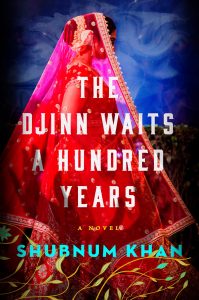Alex Brown Reviews The Djinn Waits a Hundred Years by Shubnum Khan
 The Djinn Waits a Hundred Years, Shubnum Khan (Viking 9780593653456, $28.00. 320pp, hc) January 2024.
The Djinn Waits a Hundred Years, Shubnum Khan (Viking 9780593653456, $28.00. 320pp, hc) January 2024.
When I started Shubnum Khan’s first novel to be published in the US, The Djinn Waits a Hundred Years, I had no idea what to expect. I haven’t read much South African speculative fiction, and nothing that delves into Indian culture transplanted to Africa. It’s not a history or culture I’m familiar with, which was all the more reason I was excited to read it.
After her mother dies of cancer, Sana and her father, Bilal, set out in search of a new home. Their path takes them to Durban, a large, eastern city on the Natal Bay of the Indian Ocean, and specifically to a crumbling mansion overlooking the sea. A mishmash of architectural styles, Akbar Manzil should have a long waitlist of eager potential tenants, but instead residents flee almost as soon as they move in. The plumbing leaks, the electricity flickers, and the house has an eerie feeling, like someone is watching you. The only long-term residents are the caretaker, an old man with a failing memory known only as Doctor, three bickering middle aged women, and a maid with the habit of speaking of herself in the third person. Friendless and adrift, Sana wanders the house peppering the residents with questions and jotting down their thoughts and memories in her little notebook. The house resents her nosiness, and the djinn that also lives here is curious about her and about the ghost of her dead sister who constantly harasses her.
While on one of her sojourns, Sana discovers a room tucked away. It hasn’t been touched in decades, but whoever last occupied it clearly spent a lot of time there. She finds some old journals and begins reading about the woman who belonged to this room, Meena. Here’s where the story jumps and splits its time between present and past.
Meena is the second wife of a wealthy Indian man who settled in Durban with his first wife, Jahanara, an arrogant Indian woman who claimed a lineage going back to the Mughals. Akbar Ali Khan ignores her insistence on being as British as possible and instead fills his estate with animals and architecture that remind him of his youth traveling the world. The more he insists on being himself, the more Jahanara seethes. Not helping matters is his stubborn, demanding mother, who clashes with Jahanara on every level, and his two unpleasant children. Akbar drags Meena into marriage against her will, but over time they begin to fall in love. But darkness and tragedy lie around the corner. Something terrible will happen in Akbar Manzil, and the effects ripple all the way to Sana’s time.
Although a ghost and a djinn make frequent appearances, The Djinn Waits a Hundred Years felt closer to magical realism than standard fantasy to me. Magic is a part of the characters’ world, it isn’t something that can be taken or wielded, nor can it be manipulated or taught. It isn’t some tangible force but more like a force of nature. Despite the title, the djinn plays a fairly minor role. Mostly, The Djinn Waits a Hundred Years is a story about a lonely, haunted teenage girl and the lonely, tormented young woman who lived a century earlier. It is a story of grief, of parenthood, of the ways our community can both support and fail us, and of the consequences of colonization and imperialism.
Every character in the present-day portion of the story carries their grief around like a stone strapped to their back. Some have children they never see or regrets of past choices. Bilal tried to run from his grief while Sana herself is so attached to it that her dead sister feeds off it. Sana was only a child when her mother died, but they were never close; her mother always kept her at a distance for reasons her daughter never understood. In the past, we see motherhood in a variety of ways: Akbar’s mother uses it as a weapon; Jahanara as a status symbol; and Meena as a gift for her husband and child. Fatherhood is also called to task. Bilal and Akbar both love their children, but both also failed them in key, painful ways. In the past, no one had any community to lean on, despite being surrounded by people, while in the present, it’s up to Sana to show the residents of Akbar Manzil that they already are a community.
As far as colonization goes, only Meena seems to recognize the harm in the imperial machine. Jahanara worships at the altar of British imperialism. She fills her home with Western art and furniture, associates only with white, affluent Westerners, and talks about how light her skin tone is. Akbar scoffs at her Westernization, but gladly benefits from colonialism. He spends his youth wandering from colony to colony, empire to empire, reaping all the benefits and looking away from all the pain. He makes his wealth from a sugar factory that he staffs with underpaid Indian immigrants. He puts exotic animals from all over the world into his estate and cannot see the hubris in that. And he forces a marriage onto a woman who did not want him or his wealth. Now, with the collapse of the colonial empire and the end of apartheid, Sana lives in a world where the past holds tremendous sway. The house may be in ruins, but its occupants cannot escape it or improve it, only survive it.
The Djinn Waits a Hundred Years is a powerful, gorgeous novel. Shubnum Khan has written a story brimming with evocative prose, well-developed characters, and fantastical elements rendered so realistically you forget you’re reading speculative fiction. This is one of those books I wish I could read again for the first time.
Alex Brown is a librarian, author, historian, and Hugo-nominated and Ignyte award-winning critic who writes about speculative fiction, young adult fiction, librarianship, and Black history.
This review and more like it in the February 2024 issue of Locus.
 While you are here, please take a moment to support Locus with a one-time or recurring donation. We rely on reader donations to keep the magazine and site going, and would like to keep the site paywall free, but WE NEED YOUR FINANCIAL SUPPORT to continue quality coverage of the science fiction and fantasy field.
While you are here, please take a moment to support Locus with a one-time or recurring donation. We rely on reader donations to keep the magazine and site going, and would like to keep the site paywall free, but WE NEED YOUR FINANCIAL SUPPORT to continue quality coverage of the science fiction and fantasy field.
©Locus Magazine. Copyrighted material may not be republished without permission of LSFF.








